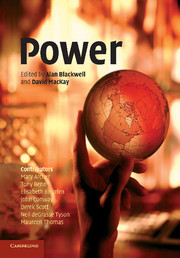Introduction
Published online by Cambridge University Press: 07 August 2009
Summary
Space, time and power are fundamentals of physics that determine the dynamic structure of our lives. Recent publications from the Darwin College Lecture Series have addressed two of these topics: Space in the 2001 lecture series and Time in 2000. Each of those volumes included a range of perspectives that span the arts, humanities and sciences. Now, in this new volume, we have invited seven international authorities to analyse and interpret the theme of Power as it is understood in their different fields of learning. The subjects that they consider include not only the sources of power that humanity has at its disposal, but also the forms of power that are exerted over us by cultural products and societies.
Life on earth, and of course all human activity, depends on the availability of sufficient power to support that activity. Mary Archer starts our exploration of power by considering where this power comes from. Drawing both on her academic work as a researcher in chemistry and Professor of Energy Policy, and on her public life including presidency of the National Energy Foundation, Archer reviews and forecasts human power usage and supply. Her chapter on the future of sustainable power sources addresses the rate with which we consume fossil fuel resources, and the alternatives that might supply the hundreds of exajoules we consume each year.
Information
- Type
- Chapter
- Information
- Power , pp. 1 - 3Publisher: Cambridge University PressPrint publication year: 2006
